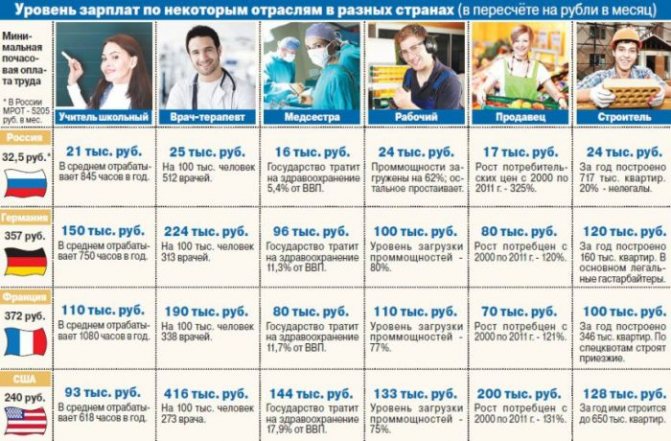Relativity of calculations
Before moving directly to the numbers, let us warn you about the relativity of the values. The minimum gross parameters per hour are the only figure precisely established by law. Everything else, including taxes, number of working hours, salary levels by profession and region, conversion to other currencies, etc. values are changeable.
We will use average values for the whole of Germany, but readers should understand that these are indicative wages that make it easier to understand the situation.
Minimum wage
Still don't know Polish?
Download a free trial lesson from Eshko and take part in the iPhone draw.
The minimum wage was established in Germany only in 2015 (Mindestlohngesetz vom 11). This is the gross rate in euros per hour of work (gross is the amount of payment before taxes).
Interestingly, before the introduction of a hard minimum wage, more than 4 million jobs paid below the established level. That is, for a large number of workers, incl. and foreigners, the adoption of the law became a fact of increasing wages in Germany.
Changes in the minimum wage in 2015-2022
The minimum wage is adjusted every 1-2 years. It has changed several times since 2015, and we have the most current data for 2021. In general the values are:
- 2015 – 8.50 €.
- 2017 – 8.84 €.
- 2019 – 9.19 €.
- 2020 – 9.35 €.
- 2021 (from January) - 9,50 €.
In addition, future increases are planned:
- From July 1, 2021 – 9.60 euros.
- From January 1, 2022 – 9.82 euros.
- From July 1, 2022 – 10.45 euros.
Let us remind you that we are talking about the gross rate for 1 hour of work.
Minimum wage per month (gross)
This value is more familiar to people from the former USSR, but in Germany it is not fixed by law. We can calculate its approximate values, implying a 20-day working day of 8 hours each, i.e. 160 working hours per month.
The hryvnia and ruble exchange rates are taken as of January 2021 and may have a certain volatility (price variability) in the future.
So, the minimum gross payment per month for 2021 is:
| In Euro | 1 520 € |
| In rubles | 138 005 ₽ |
| In hryvnias | 52 935 ₴ |
| In Belarusian rubles | 4,837 BYR |
Not bad numbers, considering that we are talking about the minimum amount of payment. However, the German tax burden is one of the highest, and calculating net amounts will reduce these amounts.
Average salary and available vacancies
Concrete formworker. Salary ranges from 7-10 euros per hour. The work schedule is within 10-12 hours of work per day, you need to work 5-6 days a week. Accommodation in Hamburg is provided free of charge. You need a Polish visa, which will be valid for at least three more months. It is not necessary to know German.
Painter-finisher. Work experience is required - at least two years. The hiring company, GHMB BauService Group, pays for housing at its own expense. The remaining information is provided after the submitted resume.
How to find a job in Germany? What do you need to know? Do I need to study? How much can you earn? What do you need to be prepared for? Answers in the next video.
Builder-handyman. Wages range from 6–12 euros per hour, depending on specific skills and output. Adult, healthy and physically strong men in the age group from 20 to 55 years inclusive are required. Work experience is required (at least one year).
Specialist in interior work - finishing, repairs, installation of plumbing. Salary depends on specific skills and the number of working hours, work experience is at least five years, experience working under heavy physical exertion is welcome, and it is also necessary to have experience working in foreign companies in Europe. Salary per month is in the range of 1500–1700 euros, issued in two stages: an advance payment to a bank card from the 1st to the 5th, and the rest on the 20th. A construction worker works between 40–45 hours per week.
Average salary for engineers in Germany.
Civil engineer. The salary is negotiated when submitting your resume to Neufeld Bau Center GmbH. Requirements: higher education in engineering and architecture, work experience in the specialty, knowledge of spoken Russian and German, ability to negotiate, work in a team. The company offers good pay, flexible work hours, and housing is provided.
Roofer, insulator and façade builder in Germany and Sweden. Salary ranges from 2–2.5 thousand euros, depending on the position and region. Career growth is possible, work experience is required (at least two years). Required personal qualities from the applicant: dedication, desire to develop, punctuality, absence of bad habits. Weekends are negotiated with the employer, working hours are full.

Builders in Germany have good earnings.
Drywaller. Salary from 6.5 euros per hour, work experience (at least one year) is important. The working day lasts from 10 to 12 hours, and the weekend is 1-2 times a week. For an additional fee, the worker can go on his day off. Housing is provided at the expense of the company.

Construction is a sought-after specialty in Germany.
Work at a construction site. Salary ranges from 8.5–10 euros per hour, standard eight-hour schedule, 5 days a week, Saturday and Sunday are days off. Salaries can be received in cash or by transfer to a bank account. About 1,500 euros per month, of which 400 will be spent on rent (3-4 people per room). Basic requirements for a worker: age from 18 to 35 years, desire to work, motivation to earn money. Knowledge of the German language at a conversational level is welcome; English is not required, but will be an additional advantage.
Builder. From 18 to 60 years old. You need a Polish or Lithuanian visa. Work in the capital - Berlin. Salary is 10-13 euros per hour, the best workers can receive up to 15 euros. Work schedule – 6 days a week, 10 hours a day.
Watch an interesting story from a man who spent a quarter of a century on German soil about life in Germany in general, and about working in construction in particular.
How much is the salary tax in Germany?
It would be nice if we had the opportunity to declare a specific percentage of taxes in Germany. Here is the gross amount, subtract taxes from it - you get the net. However, the German tax system is also one of the most complex.
The main fees paid by the employee are:
- Income tax – this value can vary from 14% to 45%.
- “Church tax” - paid by parishioners of some denominations, but may not be collected upon official withdrawal from the Kirchensteuer parish.
- Solidaritätszuschlag is the so-called. a solidarity tax (about 5.5%), the funds of which are aimed at equalizing the development gap between the East and West of the country. From January 2021, it is only levied on those whose annual gross income is more than €73,800.
- Social benefits : medicine, pension funds, unemployment, loss of ability to work.
In addition to the fact that each of the values itself is changeable, payments also depend on the number of children (more about child care benefits), geography of residence, tax class, gross value, etc.
Example of taxes . A German from the western part of the country with one child and 3rd tax class will receive:
| Gross | Taxes and fees | Net |
| 2 000 € | 429,67 € | 1 570,33 € |
| 3 000 € | 830,63 € | 2 169,37 € |
We do not aim to reveal all the nuances of German taxation in this small section, but only want to show the approximate differences between gross and net.
Minimum salary after taxes (net)
To calculate the net average monthly minimum wage, we will use the above data. Let’s also look at the data from the Federal Office of Statistics, which shows that with full-time work, the net share of gross wages ranges from 59% to 67%.
The spread is quite large, so for calculations we will use the average of these parameters, namely net = 63% of gross .
Minimum salary per month in net (rates for January 2021):
| Euro | 958 € |
| Rubles | 86 979 ₽ |
| Hryvnia | 33 280 ₴ |
| Belorussian rubles | 3,050 BYR |
Have the numbers become less beautiful when taking into account travel and accommodation? But we are still talking only about the minimum size. Let's look at the averages.
Average salary in Germany in 2021
Calculation features:
- Unlike post-Soviet countries, where the calculation uses the arithmetic average method, when the total accrued wage fund is divided by the number of full-time (freelance) employees, in the EU countries the medial method is used.
- The bottom line is that the entire set of indicators on employee salaries is arranged in ascending order and the one that is exactly in the middle is selected.
- According to economists, the second method gives a more objective picture of the labor market.
- All reports indicate the average salary before taxes. It should be taken into account that the fiscal burden in Germany reaches 40%.
- However, the country has a practice of social payments (SG), which ultimately increases the amount received in hand.
Average figures in 2021
In general, for the country:
| gross | 3600€ |
| net | 2200€ |
Salaries in the private sector:
| Working period | In hours | Without SV | Taking into account SV |
| hour | 1 | 25 | 32 |
| day | 8 | 204 | 261 |
| a week | 38 | 1022 | 1300 |
| month | 152 | 4088 | 5200 |
By profession:
Low paid:
| Speciality | Monthly salary range € |
| Driver | 2200–2500 |
| Housemaid | 1600–1800 |
| Street cleaner | 2000–2500 |
| Driver | 2500–3000 |
| Nurse | 2500–3000 |
| Tax consultant | 2200–2700 |
| Waitress | 1600–1800 |
| Cook | 1700–2000 |
| Police officer | 2000–3800 |
| Salesman | 2000 — 2500 |
| Gardener, loader | 1800–2200 |
| Cleaning woman | 1600–1800 |
| Welder | 4000–4200 |
| Builder | 3400–3900 |
| Surgeon | 6200–6900 |
| Teacher | 3500–4200 |
| Electrician | 4000–4200 |
| Lawyer | 5000–6100 |
Average level:
| Architect | 4000–4500 |
| A bank employee | 3800–4300 |
| Accountant | 3200–3600 |
| Professional worker | 4000–4200 |
| Firefighter | 3800–4200 |
| Welder | 4000–4200 |
| Builder | 3400–3900 |
| Teacher | 3500–4200 |
| Electrician | 4000–4200 |
Highly paid:
| Psychotherapist | 5300 |
| Doctor | 5400–5800 |
| Gynecologist | 15 850 |
| SAP Specialists | 7000 |
| Lawyer | 5000–6100 |
| Surgeon | 6200–6900 |
| Working with social media | 5000 |
| Neuropathologist | 10 800 |
| Foundry engineer | 6200 |
Differences by territorial basis
Salary levels differ in different federal states. This depends on the economic potential of the region and the local taxation system.
Some of the most popular regions for immigration:
| City | Average salary € per month (before taxes) |
| Hamburg | 4200 |
| Hesse | 4000 |
| Stuttgart | 3930 |
| Thuringia | 3800 |
| Berlin | 3462 |
| Munich | 3680 |
| Brandenburg | 3750 |
| Rhineland-Palatinate | 3700 |
| Erfurt | 2760 |
Gender inequality
In Germany, women generally earn about thirty percent less than men.
Payment principles:
- It should also be taken into account that only highly qualified specialists with work experience and certain achievements in their field can immediately get a highly paid vacancy.
- Beginners expect a low, or at best, average annual income, not exceeding 10–15 thousand euros.
- However, as the length of service, experience and qualifications increase, wages increase significantly.
- The national average increase in average wages is 1.8% per year, and so far this trend continues.
- Payment is calculated not per month, but per hour, shift, week or year.
Features of the relationship with the employer:
- The initiative to increase wages comes from the employee.
- The request is made orally or in writing, but with mandatory argumentation. For example, the reasons given are:
- accumulated experience;
- obtaining new qualifications;
- increased level of knowledge (completion of courses, obtaining a scientific degree, etc.);
- willingness to increase working hours;
- mastering a related specialty.
- The applicant clearly states the desired amount of the increase.
- The frequency of such requests should not exceed one and a half years.
What is the average salary in Germany?
Below we will definitely analyze average salaries by industry, but first we will look at the average values for the economy in general. This will give an idea of real income, incl. and foreigners legally employed in Germany.
The average payment is not fixed by law and is solely statistical data for the past period. Information from the Federal Office of Statistics for 2017 is widely circulated. Despite the time that has passed, the figures give an idea of the order of average monthly payments.
We will provide gross and net data based on the previously provided data and calculation methods.
Gross:
| Euro | 3 771 € |
| Rubles | 342 381 ₽ |
| Hryvnia | 131 003 ₴ |
Net (based on 63% of gross):
| Euro | 2 375,73 € |
| Rubles | 233 859 ₽ |
| Hryvnia | 89 479 ₴ |
Agree, such figures look more attractive, especially when compared with Ukrainian realities.
Salary table in Germany by profession
The differences in average salaries by economic sector are quite significant. However, here too there are variations in payment depending on the size of the enterprise, the employee’s length of service, geography and many other reasons.
We will again use official statistics, this time averaged by profession. We will present salaries in euros (gross), and annual figures will be obtained by multiplying the monthly average by 12.
| Profession | Monthly average, € | Average per year, € |
| Teacher | 3 300 – 4 500 | 39 600 – 54 000 |
| Engineer | 4 100 – 5 600 | 49 200 – 67 200 |
| Auto Mechanic | 2 300 – 3 150 | 27 600 – 37 800 |
| Janitor, cleaning lady | 1 700 – 2 550 | 20 400 – 30 600 |
| Welder | 2 100 – 3 100 | 25 200 – 37 200 |
| Doctor | 7 000 – 8 000 | 84 000 – 96 000 |
| Dentist | 3 600 – 4 400 | 43 200 – 52 800 |
| Nurse | 2 800 – 3 000 | 33 600 – 36 000 |
| Salesman | 2 100 – 3 000 | 25 200 – 36 000 |
| Bus driver | 2 200 – 3 000 | 26 400 – 36 000 |
| Programmer, designer | 4 000 – 4 500 | 48 000 – 54 000 |
| Builder | 2 100 – 3 100 | 25 200 – 37 200 |
| Miner | 3 300 – 3 500 | 39 600 – 42 000 |
| Police officer | 2 800 – 4 200 | 33 600 – 50 400 |
| Firefighter | 4 000 – 4 200 | 48 000 – 50 400 |
| Cook | 1 600 – 3 300 | 19 200 – 39 600 |
| Loader | 1 500 – 2 000 | 18 000 – 24 000 |
| Electrician | 2 500 – 2 900 | 30 000 – 34 800 |
| Plumber | 1 600 – 2 100 | 19 200 – 25 200 |
The limits of the average values depend on the application. So, for example, the column “teachers” contains data from both school and university teachers, and “engineer” includes both technologists and mechanics.
§ Salary information from job offers
The data in the table is taken from job advertisements posted in an online newspaper in Russian Germany. You can find all current job offers for engineers in the Work in Germany the Internet newspaper of Russian Germany.
Table 2. Information on salaries from job offers for engineers, technologists, and mechanics
| date | Position, profession | Salary information |
| March 2021 | Driver - auto mechanic (Berlin) | 700 |
| February 2021 | Auto mechanic, Auto mechanic, Motor mechanic (Oranienburg/Berlin) Working hours: 08.30-17.30 | 1200-1600 |
| September 2020 | Car mechanic in Finland (Helsinki) Working hours: 40 hours per week | hourly |
| February 2020 | mechanic (service station) Working hours: 8.00-16.30 | 2000 euros |
| August 2019 | Auto mechanic (35094 Lahntal Siegenerstrasse 33) Working hours: 8-17 | 1500-2500 |
| April 2019 | Auto Mechanic. (Munchen) | from 1600 euros netto |
| January 2018 | Design engineer (Munich) Working hours: 40h | by agreement |
| May 2017 | commissioning engineer SPS (PLC) (Germany) Working hours: 8:00-17:00 | negotiable |
| April 2017 | Mechanic (Deutschland, Renchen.) Working hours: 9.00 - 18.00 | Piecework |
| May 2016 | engineer, builder (Germany, Freiburg) Working hours: 8 hours | from 1500 |
| October 2014 | truck repair mechanic (Autowelt GmbH, Niederlauer, Deutschland) Working hours: 8-17 | ab 2000€ netto |
| October 2014 | truck repair mechanic (Autowelt GmbH, Niederlauer, Deutschland) Working hours: 8-17 | ab 2000€ netto |
Footnotes:
The euro exchange rate in the tables is taken as of May 26, 2021 and is 90.06 rubles at the rate of the European Central Bank. Exchange rates in Germany
- Pages:
- 4
- Average and minimum salaries in Germany
- Average salaries in EU countries
- Taxes and duties on salaries in Germany
- Average salaries by profession in Germany
- Average salary in Germany in 2021 per month in rubles and euros
- Related topics:
- Minimum pension in Germany
- Labor legislation in Germany
- Permit to stay and work in Germany
- How to find a job in Germany
- Help with finding a job in Germany
- Free German courses in Germany
What are the highest paying professions?
The table above clearly shows who earns more. However, the statistical agency separately publishes the market areas in which wages are maximum (without specifying specific figures). These include (from largest to smallest):
- Banking.
- Pharmaceuticals.
- Automotive industry.
- Telecommunications.
- Chemistry.
- Heavy engineering.
- Production of medical equipment.
- Air transportation, incl. space industry.
- Insurance.
- Energy sphere.
- Trade.
- Civil servants.
- Agricultural work.
- Health and social sector services.
- Advertising.
- Tourism.
- All types of education.
- Craftsmen.
- Hotels.
- Gastronomy.
As you can see, the data intersect, and sometimes in quite bizarre ways. It is logical that banks and IT earn the most, but rather low-paid pharmacists are combined with pharmacology as one of the highly paid industries. The reason is that the profession itself does not have high salaries, but in the industry as a whole there are many other better paid specialists who make it a leader in terms of average indicators.
Dependence on federal state and other factors
The geographical difference in wages in Germany has not yet been eliminated. The eastern lands (former GDR) receive less, the western ones, accordingly, are paid higher. This is due to the level of regional economic development and a number of other factors.
Statistics show that the difference between “rich” and “poor” lands can reach 40%.
The highest paying regions traditionally include Hessen, Bayern, and Baden-Württemberg. The lowest salaries are in Sachsen, Brandenburg, Thüringen, Sachsen-Anhalt and Mecklenburg-Vorpommern.
There are other factors that influence who gets paid and how much in Germany. For example, the size of the enterprise - the salary in a small company can be 10% - 30% lower than in a large holding company. Women receive 15% - 30% less than men for their work.
Taxes
The average salary in Germany is subject to taxes. Usually from this income the following is calculated:
- church tax;
- personal income tax;
- health insurance;
- pension insurance;
- solidarity tax;
- unemployment insurance;
- in case of emergency.
In all countries of the European Union, such deductions are very high. In addition, the amount of deduction directly depends on the level of wages. This can be seen in income tax, which depends on average annual salaries:
- for salaries up to 8,800 euros, personal income tax is not withheld;
- up to 54,058 euros – 14% is calculated;
- from 54,000 to 256,300 euros – 42%;
- if salaries for the year exceed 256 thousand, then personal income tax is 45%.
Most often, in addition to income tax, working Germans are charged 4 more common social taxes. These are health insurance, pension insurance, unemployment insurance and long-term care insurance. The amount of payment for all taxes is about 40% of the salary, so half is paid by the employer.











